Rubinstein Day of Beauty
In 1936, Helena Rubinstein opened a new salon in a seven-storey building at 715 Fifth Avenue, New York. Described as ‘a new world of beauty’ the salon was designed to provide clients with all their beauty needs.
Here is a world where you may find blessed release from the whirring world without, and complete realization of your beauty within. Here Helena Rubinstein offers you the fruits of her rich and almost legendary experience in bringing beauty to the women of every land. Here she has gathered the myriad talents and services of artists, scientists, technicians. Specialists in Skin Culture, Coiffure Stylists, Cosmetic Colorists, Dieticians and Physiotherapists.
Here is everything to contribute to the full and perfect expression of your loveliness—your complexion, your figure, your hair, your hands, your whole personality. Here is an inspired new conception of your beauty.(Rubinstein advertisement, 1937)
Along with the usual reception areas, purchasing counters and treatment cubicles the air-conditioned building was equipped with a gymnasium, movie theatre, restaurant, library, solarium and hairdressing salon. Rubinstein was not the first person to incorporate many of these features into a beauty salon. Taking gymnasiums as one example, Elizabeth Arden already had an entire floor of her salon at 691 Fifth Avenue, New York dedicated to diet and exercise. The Richard Hudnut salon at 693 Fifth Avenue, New York also had an exercise area on the roof of the building where clients could engage in badminton, checker tennis, rope skipping and other exercises before going downstairs to have beauty treatments.
Day of Beauty
Women coming to Rubinstein’s Fifth Avenue salon could book in for individual treatments or, for US$25.00 or more, sign up for a complete ‘Day of Beauty’.
The full day of treatments would start with an assessment. The client’s basal metabolic rate (BMR) was calculated and her blood pressure, height, weight and other vital statistics were also taken down for future reference.
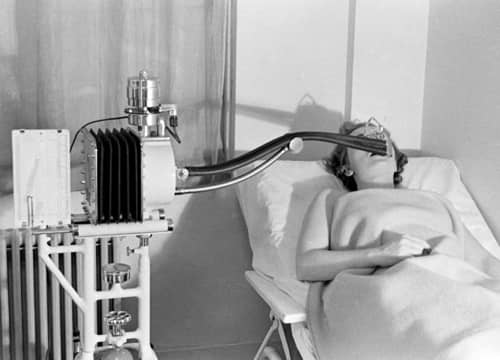
Above: 1937 A client having their BMR assessed by measuring her oxygen consumption to help determine her degree of fitness.
Dressed in a playsuit provided by the salon, the client could then engage in a series of exercises in the gymnasium equipped with a sprung floor, bars, gym mat, fitness bicycles, rowing machines and other sports equipment. If physical exercise was ruled out then she could take deportment or other classes.
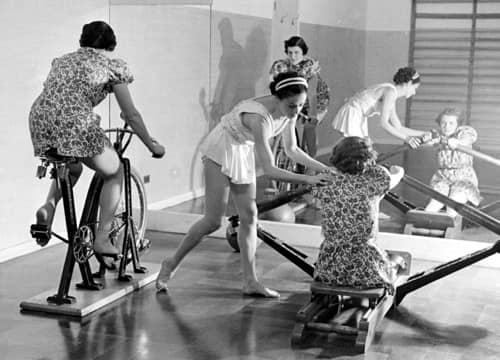
Above: 1937 Clients wearing playsuits undergoing a range of exercises to improve their fitness or help with weight reduction.
The morning activities were followed by a quick shower and a massage. The type of massage depended on the client: light for soothing and tension release; heavy for weight reduction. Before the massage, clients could elect to have a San-O-Therm treatment. The treatment involved the client lying on a massage table covered with an electric blanket under a cabinet warmed with an infra-red heater. This was said to increase circulation, facilitate skin elimination (i.e. increase sweating), relieve pain and relax tense muscles and ligaments.
Clients could also take a ‘restorative vitamin sun-bath’ in the Sun Ray Clinique stretched out on beds of sand bathed in ultra-violet light.
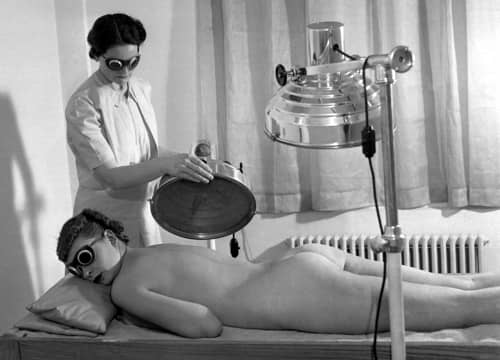
Above: 1937 Ultra-violet light treatment
Other options before lunch included a selection of baths – ‘pasteurized milk’, mineral salts or herbal – paraffin wax treatments, needle showers and body scrubs.
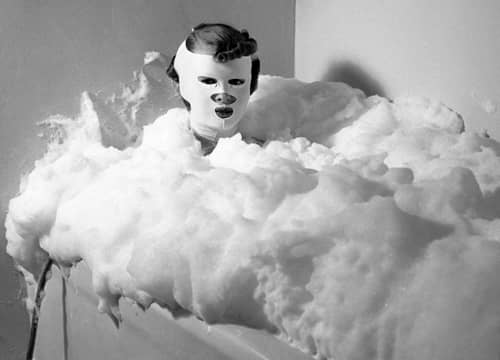
Above: 1937 Pasteurized Milk Bath. Compressed air is forced through the tube on the left into a bath made of a milk preparation to produce the foam. The client is wearing a Beautilift Mask.
The morning activities were followed by a low-calorie lunch – based on a diet from the Bircher-Benner Sanitarium in Zürich – and then a fifteen-minute period of rest and relaxation before the afternoon beauty treatments began.
Before starting the facial, the client’s face was examined under a Derma-Lens to determine the condition of her skin and the treatments that would be required.
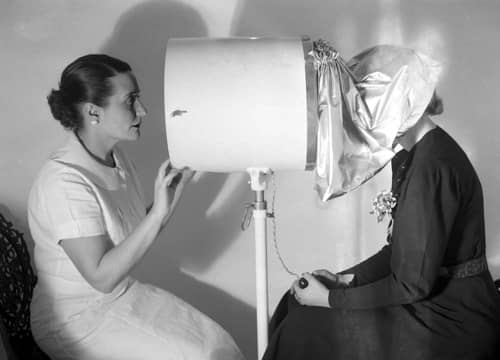
Above: 1937 Derma-Lens assessment. The device displays a magnified image of the client’s face back to them as well as to the beauty consultant. These devices were first introduced in 1934 but were superseded by the Polaroid Skin Analyser that Rubinstein introduced in 1939.
Facial treatments were selected according to skin-type and any problems picked up in the facial assessment. As part of a full facial the client would also be recommended to have a mask or could elect to have an Electro-tonic Treatment to activate circulation and firm her skin.
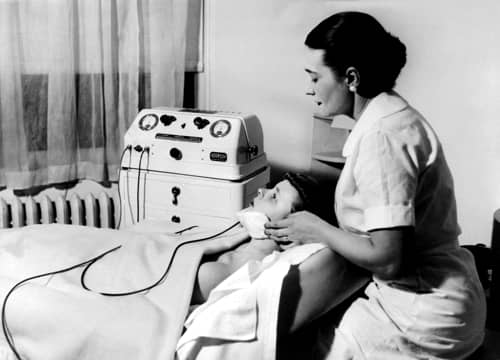
Above: 1937 Electro-tonic Treatment for the throat.
Having completed her facial treatments the client would wait in the Salon Health Bar drinking a fruit goblet until a hairdresser was available.
In the hairdressing salon the client’s scalp was massaged with a Balsam Oil Steamer and then her hair was cut and set in the latest Paris style while her hands and feet were manicured. She was then ushered into a make-up cubicle where she was made up while receiving advice about the best Rubinstein powder, rouge, lipstick and eye make-up to use for her particular colouring.
By the end of the day the client had spent up to US$150 or more through elective treatments but most felt it was worth it. The success of the concept can be measured by the fact that when Rubinstein opened her revamped Faubourg Saint-Honoré salon in Paris in 1937 it was also fitted with San-O-Therm beds, BMR testing machines and the other equipment she had installed in New York.
First Posted: 21st November 2017
Last Update: 30th December 2021
Sources
Fabe, M. (1972). Beauty millionaire. The life of Helena Rubinstein. New York: Thomas Y. Crowell Company.
Rubinstein, H. (1965). My life for beauty. Sydney: The Bodley Head Ltd.
Slesin, S. (2003). Over the top: Helena Rubinstein extraordinary style, beauty, art, fashion design. New York: Pointed Leaf Press.
Woodhead, L. (2003). War paint. Miss Elizabeth Arden and madame Helena Rubinstein their lives, their times, their rivalry. London: Virago Press.
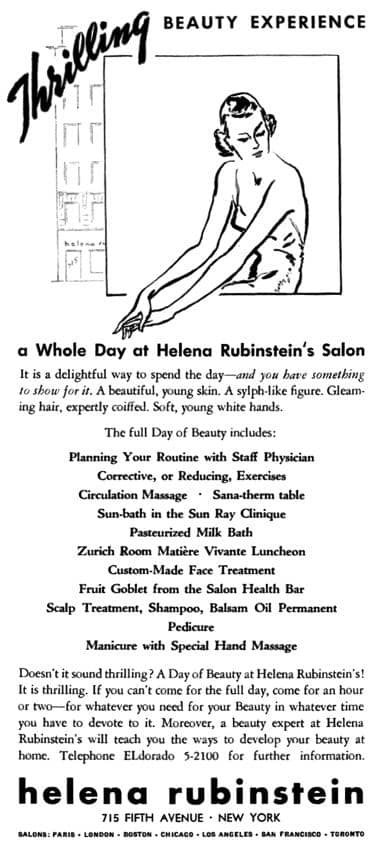
1938 Helena Rubinstein Day of Beauty.
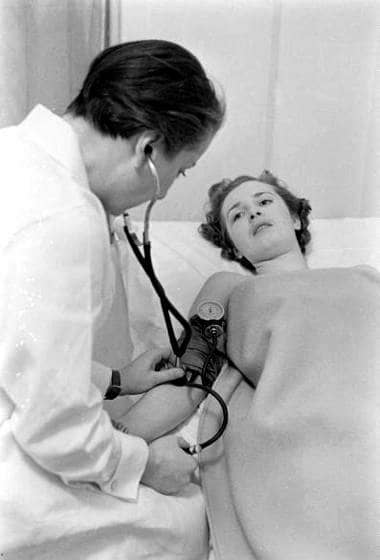
1937 Client having her blood pressure measured in the New York salon.
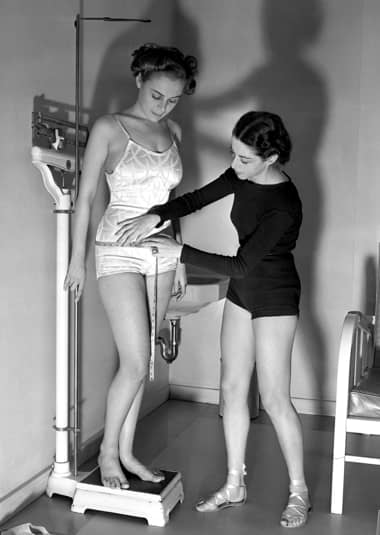
1937 Client having her vital measurements taken in the New York salon.
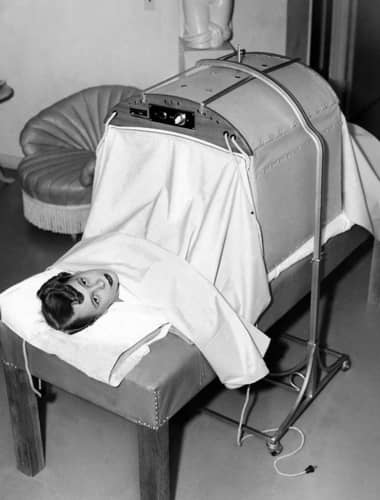
1937 Helena Rubinstein’s San-O-Therm treatment.
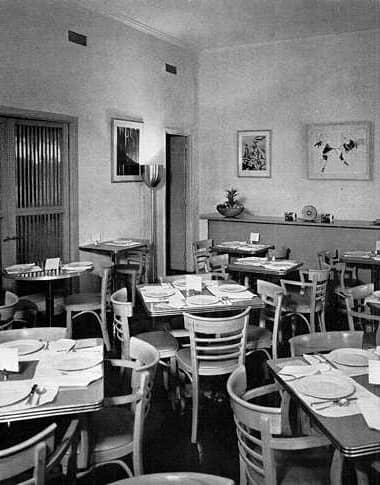
1937 Restaurant in the Zürich Room in the Fifth Avenue salon.
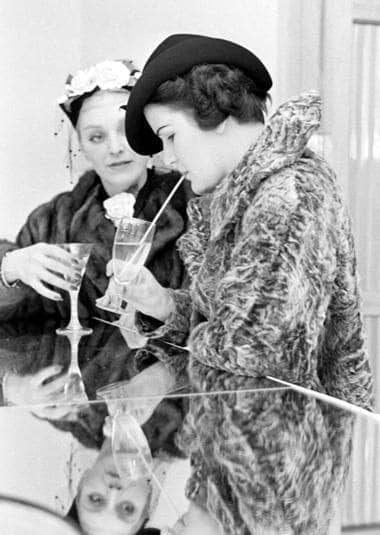
1937 Clients drinking fruit juices at the Health Bar.
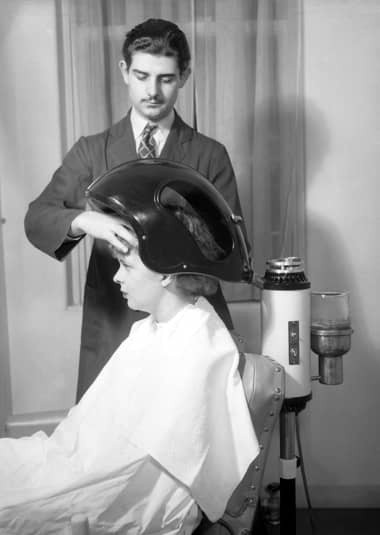
1937 Balsam Oil Steamer used in permanent wave treatments to produce a soft wave.
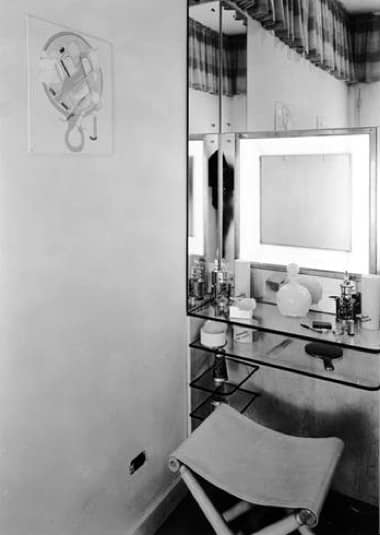
1936 Make-up booth.
